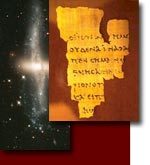| Site Map | Contacts | Links | Newsletter | |
Old Testament:
Pseudepigrapha
Pseudepigrapha is the transliteration of the Greek plural noun that means "with false superscription" (Charlesworth 1983, xxv). This refers to a collection of writings that are falsely attributed to an important Bible character. Most of these writings were written between 200 BC and 200 AD. The Apocrypha are the books preserved in Greek, but not Hebrew that are included in the canon of the OT by the Roman Catholic Church. Ecclesiasticus also called the Wisdom of Ben Sirach has a description of God's creation in Chapter 43.
The Book of Jubilees is the supposed account of events from creation to Moses. Chapter two tells of the six day creation of the world. Events are dated according to their jubilee year. The book defends the 364 day calendar year which assures that festivals fall on the same day of the year. The date of this book is about 100 BC (Charlesworth 1985, 35-142).
The Book of Enoch contains vivid descriptions of Enoch's journeys through the universe. There are 10 heavens that one must pass through to where God dwells. He also tours earth and Sheol. Fragments of I Enoch have been found among the Dead Sea Scrolls.
The 3 (Greek Apocalypse of) Baruch tells about Baruch, the scribe of Jeremiah who weeps over the destruction of Jerusalem. God sends an angel to comfort and guide him through the heavens. Five heavens are graphically described, but there were probably a total of seven heavens because the work is incomplete, and Origen states that Baruch refers to seven heavens (Origen 1936, 91; Charlesworth 1983, 653).
